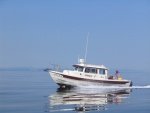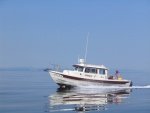South of Heaven
New member
Are there any tips on how to reduce the cabin vibrations while underway? Obviously at headway speeds they're almost non-existent then at a good clip they can be quite annoying (at least on my boat).
Maybe a better question is where are the vibrations coming from? Is it from the added accessories and loose gear? Or is it the v berth partition and the windows?
I'm not looking for a miracle cure..... but if I could reduce some of vibes I'd be happy. Just to be clear; the noise(s) I'm hearing have nothing to do with the engine or rigging.
Maybe a better question is where are the vibrations coming from? Is it from the added accessories and loose gear? Or is it the v berth partition and the windows?
I'm not looking for a miracle cure..... but if I could reduce some of vibes I'd be happy. Just to be clear; the noise(s) I'm hearing have nothing to do with the engine or rigging.


